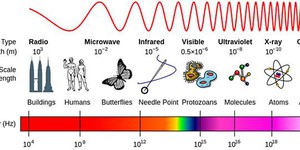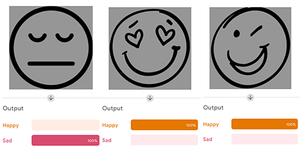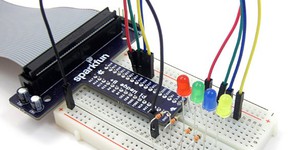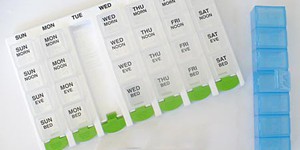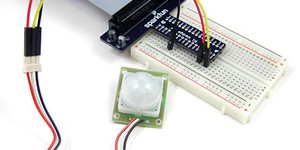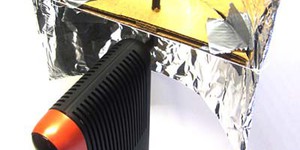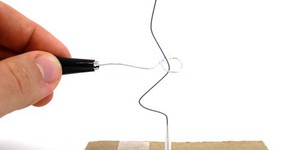Seventh Grade, Computer Science Science Projects (34 results)
From cell phones to social media, computer science is a part of your daily life. Everything from traffic lights to medical devices requires both computer hardware and software these days. Creative problem solvers are using computer science to tackle social problems, improve agriculture, make great entertainment, and start exciting new companies. What could you create and innovate with a bit of tinkering and programming?
|
Select a resource
Sort by
|
Have you ever suffered from poor Wi-Fi reception for your smartphone, tablet, or laptop? Certain materials can actually block a Wi-Fi signal; do you think that could be part of your problem? In this science project, you will do an experiment to find out which materials cause the biggest drop in signal strength from a wireless router.
Read more
Featured
Have you heard that garlic powder is supposed to inhibit the growth of bacteria? Which do you think would make a better disinfectant: a solution of garlic powder or a solution of bleach? This project shows you a straightforward way to compare the effectiveness of different disinfectants (or other antimicrobial agents), by measuring zones of inhibition on a culture plate.
Read more
Do you think artificial intelligence (AI) is too complex to use? Think again! In this project, you will use AI to teach a web-based tool to classify happy and sad faces, or other objects, poses, or sounds. This experiment requires no coding skills; instead, you will need curiosity, creativity, and a critical eye. Why not give it a try yourself?
Read more
New
Have you ever noticed that on a hot day, it's more comfortable to wear a light-colored shirt than a dark one? Or that it's cooler in a park than walking down a street? This happens because different surfaces absorb and reflect heat in different ways. Urban heat islands are parts of cities where man-made surfaces like pavement and buildings replace natural surfaces like grass and trees. In this project, you will use temperature and satellite data to see if certain areas in a city have higher…
Read more
Lights and music make a great combination! Getting sound and lights to complement each other just right helps set the mood for everything from DJ parties and concerts, to theater shows, the circus, and ballet performances. You can put together your own lights and music show using
a Raspberry Pi.
Check out the video to see what this simple, but fun, project looks like:
Once you have the basics down, you can keep tinkering with the circuit, the sounds, and the program to make fancier…
Read more
Driverless cars use machine learning, a type of artificial intelligence, to identify road signs and other things they encounter on the road, like pedestrians and other vehicles. In this project you will take your own pictures of different types of road signs and use machine learning to identify the signs using a free online tool (no programming is required). You will then attempt to improve your machine learning model so it can identify signs in a variety of environments.
Read more
Remembering to take medication or perform a test regularly, consistently, and at specific times can be difficult for elderly people with short-term memory loss, or teenagers absorbed in activities. With mobile devices becoming our constant companions, could a smartphone or tablet offer a solution?
The Massachusetts Institute of Technology (MIT) has created a simple tool making it possible for anyone who has a computer and Internet access to create a reminder app. It is easy, quick, and…
Read more
New
Engineers are trying to tackle the world's ocean pollution problem using robots. Some robots, like Mr. Trash Wheel and the ship featured in this Mark Rober video, are stationary and collect trash as it flows out of rivers before it gets into the ocean. Others, like the Jellyfishbot, are mobile and can squeeze into narrower spaces to collect trash:
Can you build and test your own trash-skimming robot? If you do not have access to a natural body of water to test it in, you can use a bathtub or a…
Read more
Have you ever wished you could create an alarm system to guard your stuff? Or what about throwing a surprise party for someone and automatically playing music and flashing lights when they walk in the door? You can do either of these things using
a Raspberry Pi.
The kit includes a motion sensor, which can detect when people move in front of it. Check out the video to see what this simple, but fun, project looks like:
Read more
Have you ever been annoyed by poor Wi-Fi reception for your phone, tablet, or laptop? Do you wish there was something you could do about it? In this project you will learn how to build a parabolic reflector that you can attach to the antenna of a regular wireless router to help boost its signal.
Read more
Have you ever played a game that tested the steadiness of your hands? Operation® is a popular board game that requires you to perform "surgery" without bumping a tool against the edges of the game. There are also popular amusement park or carnival games where you try to move a metal loop along a wavy metal wire without letting the two touch. You can build your own version of these games using
a Raspberry Pi.
Check out the video to see what this simple, but fun, project looks like:
Read more
Have you ever seen night lights that automatically turn on when it gets dark? What about art projects, like paintings or sculptures, with embedded lights? This project will let you combine the two, by adding lights to an art project of your choice. You can make the lights automatically turn on when it gets dark using
a Raspberry Pi.
Check out the video to see what this simple, but fun, project looks like:
Read more
Do you play video games on a console or smartphone? Have you ever wished you had the power to change how a game worked, or even to create your very own game? This project will show you how to make your very own video game and controller using
a Raspberry Pi.
Check out the video to see what this simple, but fun, project looks like. Of course, you can design the looks and gameplay of your game any way you like!
Read more
|
Explore Our Science Videos
Paper Roller Coasters - Fun STEM Activity!
Aluminum Foil Boat Design - STEM Lesson Plan
Solubility Science – STEM Activity


